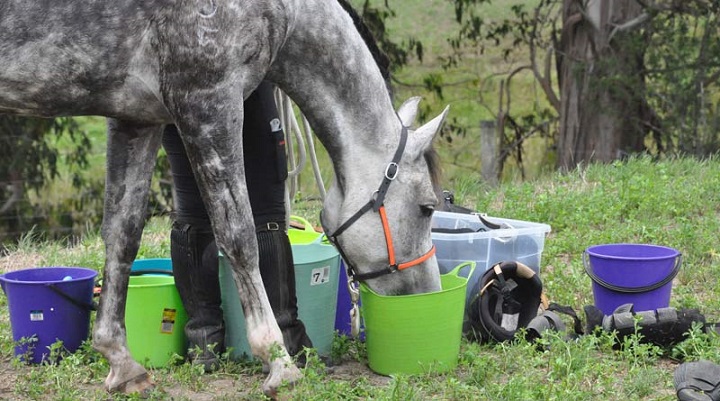It doesn’t matter whether your horse is a top-performing athlete, a trail horse out on a weekend ride, or a Cushing’s horse whose coat hasn’t fully shed even though it’s summer, if your horse is sweating more than normal, his electrolyte balance could very well be affected, and supplementation is likely necessary.
Electrolytes Explained
Electrolytes include the minerals sodium (Na), chloride (Cl), Potassium (K), Magnesium (Mg), and Calcium (Ca). In solid form, these minerals bond into salts (sodium chloride, for example), but when dissolved in water, they break down into individual ions which carry either a positive or negative charge.
The charges carried by electrolytes allow them to conduct electricity and assist in electrochemical processes in the body such as regulating heartbeat, muscle contraction, and even digestion. They also help to move fluids in and out of cells and aid in nutrient absorption. Without electrolytes, water cannot be properly retained and utilized by the body.
However, the key with electrolytes is balance. Horses naturally lose electrolytes through sweating, urine, and feces, but they gain them by consuming grass, hay, and/or feed. The exceptions are sodium and chloride, which should always be provided in the form of plain white salt (loose or in block form).
Hard-working horses who sweat for a prolonged period of time can have high levels of electrolyte losses, however. For these horses, supplementation is crucial. If electrolyte levels become unbalanced or depleted, cell function in the muscles, gut, and heart will slow or possibly shut down.
After a period of prolonged sweating, electrolytes should be supplemented for several days to make up for losses. If you plan to go on a weekend trail ride or horse show during hot weather, you can also start supplementing electrolytes several days in advance and then continue giving them throughout the event.
By the same token, not all horses need electrolyte supplementation. Horses living in cooler climates who don’t sweat regularly likely won’t. As stated above, balance is what’s most important!
Types of Electrolyte Supplements
One thing to keep in mind is that not all electrolyte supplements are created equal. Many contain sugar and other fillers, which aren’t desirable—especially for horses with insulin resistance, Cushing’s, or other metabolic conditions.
Peak Performance Nutrients, Inc. carries both paste and powder electrolytes which are made with high-quality, food-grade ingredients.
Our electrolytes contain:
• Concentrated chloride levels;
• Chelated minerals for improved absorption; and
• No sugar, fillers, dextrose, or sodium bicarbonate.
Bottom Line
It’s important to understand not only what electrolytes are, but which horses can benefit from supplementation. When choosing an electrolyte supplement for your horse, always look at the ingredients to ensure you’re getting a quality product which will provide minerals without the added sugar.
Sources
When Your Horse Needs Electrolytes
Horse Health Week: Why Electrolytes are Vital for Healthy Horses
